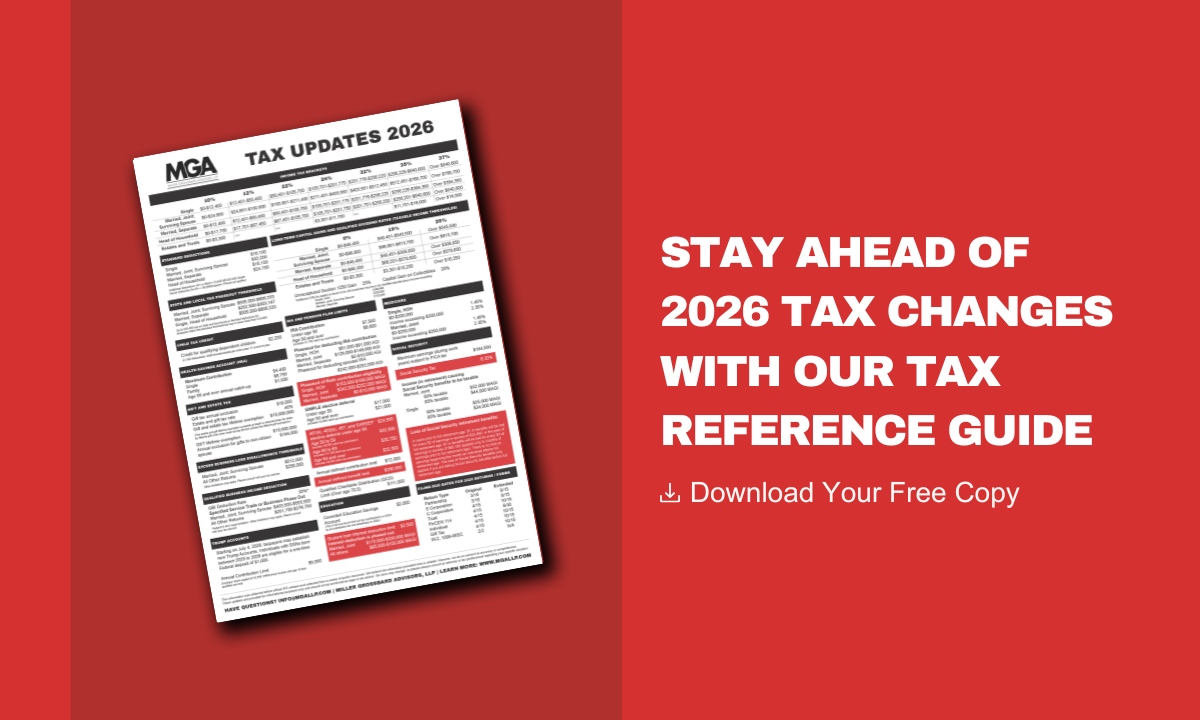The new tax laws paired with the government shutdown caused a world of chaos and confusion this tax season. Many people rushed to get their estimates completed by the April 15th tax deadline, leaving them with significant work ahead. The deductions for pass-through entities, in particular, (commonly referred to as QBID) are a major area of concern for business owners.
If you’re wondering if your business qualifies for the 20% pass-through deduction, don’t fret. Our team of experts is here to help. Different team members within our tax department here at MGA have championed different areas of the new tax law, and Ashlee Waak, one of our excellent Tax Supervisors, is our dedicated QBID specialist.
Who Can Get the 20% Pass-Through Deduction?
Partnership, S corporations, sole proprietorships, real estate investors, disregarded entities or single-member LLCs, and trust and estates all qualify for the qualified business income deduction.
Essentially this was a way for the tax code to even out the fact that corporations received much lower tax breaks and was put in place to assist the rest of the business entities.
What Is Qualified Business Income (QBI)?
QBI is any business income not including capital gains or losses or any investment type of income such as interest, dividends, or royalties that are being produced by a qualifying business.
Are There Any Limitations to QBID?
Your qualified business income deduction is limited by your business type. You have qualified businesses and specified service businesses, and then you have businesses that aren’t going to qualify for QBID at all, such as investment type businesses that holds brokerage statements and other similar items.
There’s a very complex formula that takes many aspects into account, such as your W2 wages, your original acquisition costs of depreciable assets, and your taxable income before capital gains or qualified dividends.
A few other things that go into the calculation are self-employment tax, self-employed health insurance, and retirement contributions. We strongly recommend speaking with a tax professional like MGA to help you walk through the calculation to determine if you qualify.
What Should You Do to Maximize Your Qualified Business Income Deduction If You Own an S Corporation or a Partnership?
If you own an S corporation, make sure to pay yourself and any other shareholders a reasonable wage. If you’re not paying yourself a fair salary, your tax advisor will have to calculate what the industry standard would consider a reasonable salary. This will reduce your net income but not increase your QBI wages and will go into the overall calculation to determine your available QBID.
If you’re in a partnership, make sure you’re not paying yourself or any other partners a wage. It will still reduce your net income, which also lowers your QBI income, but it will not increase your QBI wages. So essentially you’re reducing your income, but you’re not increasing the deduction. Thus you’re limiting your potential QBI deduction.
If you own a partnership or S corporation that is a specified service business in the field of accounting, health, law, consulting, performing arts, or any other type of industry where you’re providing a service but not producing a product, you need to be careful. If you exceed the income threshold, then you will either not qualify for QBID or your deduction will be phased out.
The phase-out range for MFJ is 315K and 157.5K for non-MFJ. Once your taxable income for the QBID calculation exceeds that threshold, you are in a phase-out range. Once your income exceeds 415K for MFJ and 207.5K for non-MFJ, you no longer qualify for any of the deduction. So you want to make sure that you can maximize your income while remaining in that range to get any type of deduction.
Also, if you are engaged in real estate rental businesses with triple net leases, you should consider modifying the leases. According to the IRS standards, the triple net lease does not rise to the level of a trade or business. So none of that income is going to qualify as QBI, and you will not receive any deduction.
You also want to consider that if in prior years you were expensing capital items under de minimis safe harbor rule, you should think about capitalizing them in the current year. You can capitalize assets with a cost of less than $2,500 per item, and you can a fully deduct them by taking 100% bonus depreciation, which is new under the TCJA. This will increase the original acquisition costs of depreciable fixed assets for the QBID calculation, which may increase your QBID.
MGA Has the Experts and Experience to Help You Act Quickly
Congress and the IRS make everything complex. Our job as your tax team is to simplify this for you and give you the necessary information to make smart decisions. We've published several blogs and videos regarding the new tax laws, which you can check out in the link below.
At MGA, we have the experts available to help you navigate these tricky waters. Our team is ready to help you with tax planning, preparation, and compliance.
Don’t hesitate to reach out to us today if we can help make the complex simple.
.png?width=191&name=mgalogofinal-01%20(3).png)





